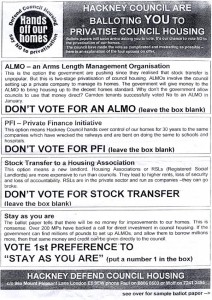Haggerston School Scandal Update
Posted: August 10, 2005 Filed under: Privatisation / Sell Offs, Schools Comments Off on Haggerston School Scandal UpdateThe following email was received by Hackney Independent in relation to the current plans for Haggerston School.
For further details on the council plans read this article here
We will keep you updated on developments as and when they happen.
Hands off Haggerston School say the pupils
‘Building work has started at Haggerston school after planning permission was granted without the normal consultation with local residents.
A massive sports center and floodlit pitch is being built, while the sports pitch across the road in Haggerston Park has been shut down because the council cannot spend the £6,200 quoted to maintain the all weather surface.
Hackney knows that the school will be more attractive to outside investors once it has a spanking new sports facility.
Very few sports are played at the school despite the fact they have a huge playground and a big park just across the road.
Planning permission was given for the new sports centre without any info being given to local residents. The council claims 85 letters were sent out and no objections received, but no one can be found in the three streets most affected — Dunloe Street, Dawson Street or Scawfell Street who remembers receiving a letter. The council has a list of every letter they claim to have sent, but this does not tally with the memory of people who definitely did not receive them.’
Haggerston School Under Threat
Posted: July 22, 2005 Filed under: Haggerston, Privatisation / Sell Offs, Schools Comments Off on Haggerston School Under ThreatWhy does the council want to turn Haggerston School into a City Academy?
Haggerston School is a popular and successful part of our community. The top schools inspector stated it was among the most successful schools in the country. Haggerston came third in the borough’s “league table”.
So why does Hackney Council want to force Haggerston School to become a privately-sponsored mixed-sex City Academy?
The government plans to bring in just 200 city academies across the country. So why have Hackney Council and their private “Learning Trust” company that runs our schools, made it clear they want every secondary school in Hackney to become either a City Academy or foundation school? Most councils will not even have a City Academy, but they want us to have four!
Looking around the country it is clear that other councils have run successful schools into the ground so they can sell them off as City Academies.
Hands off Haggerston Campaign information sheet
Turning Haggerston into a mixed school is one way of doing this.
It looks like it’s a two-part plan – first change a popular girls’ school to a mixed school, then offer extra funding if it goes over to being a City Academy.
Whatever the pros and cons of mixed schools, we should oppose this change until the Council guarantee us that they will not make Haggerston a City Academy.
We know we are not alone thinking this. While the Council and the Learning Trust cook up their plans for Haggerston School, Hackney Independent went out to ask people what they thought. In a survey carried out across Fellows Court in June and July, we found 85% of people opposed the Council’s plans.
Why are our Labour council trying to force this change to Haggerston School on us?
It is because they are obsessed with privatising everything and getting rid of their responsibilities for everything from running swimming pools to cleaning our estates.
They’ve already privatised our estate managers, now they want to shift the whole of council housing to an ALMO company.
They’ve got rid of the running of our schools to the private Learning Trust, now they want rid of as many schools as they can to City Academies.
Privatising and transferring responsibility from the council is their one and only answer to everything.
Our children are being used as guinea pigs in the biggest change in education since they brought in comprehensives. This time it is not about a fair deal for all our kids, it is about privatising our schools.
We support the Haggerston School parents, pupils and staff and stand alongside them and Shoreditch tenants and residents in opposing the council’s plans. As the girls’ banner in our photo says: “Hands off Haggerston”!
Hands off Haggerston Campaign information sheet
"Minister of Lies"
Posted: April 3, 2005 Filed under: Media, Privatisation / Sell Offs Comments Off on "Minister of Lies"From Private Eye:
If, with a general election approaching, an opposition party found its posters ripped down on government orders, its advertisements refused by newspapers, and its spokesmen prevented from booking halls for public meetings, there would be an outcry.
But this is exactly what is happening to defenders of council housing around Britain who want to campaign on an equal footing with the forces in favour of privatisation as local councils ballot their tenants over “stock transfers”.
In Lambeth, South London, where the council is controlled by a Tory-Lib Dem coalition, a proposal to sell the Clapham Park Estate to Clapham Park Homes, a subsidiary of the Metropolitan Housing Group, would see half the existing council flats demolished and 1,428 expensive private flats built at a cost of £560m – all to raise the £28m required to have improvements done to bring the remaining social housing up to the government’s “decent homes standard”. So far £2.5m has been spent on the campaign to persuade tenants to vote for the stock transfer.
Lending his support for the transfer is local MP Keith Hill, who also happens to be housing minister. In 2003 he declared: “The law is entirely clear. Tenants need to be presented with equal information about the pros and cons of the various options for which they are being consulted. That is absolutely the principle that we as government and we as ministers conform to.”
Fine words… but a blatant lie. Opponents of the transfer have alleged intimidation and abuse by board members and staff employed by the Clapham Park Project (the quango administering the transfer). The use of a “converted sports bag”, with no secure lock as a ballot box in the show flat on the estate has cast doubt on the robustness and integrity of the democratic process. And tenants also received a newsletter from the so-called “Clapham Park Independent Stock Transfer Campaign”. It included an article smearing the “No” campaigners as “pagans and racists… squatters and illegal occupiers…” No contact details were given, despite the fact that CPP staff were seen distributing it. Meanwhile locks on tenants noticeboards were changed to prevent anti-transfer literature being displayed.
Across the river in Labour-run Tower Hamlets, where a similar series of ballots are taking place, housing manager Terry Damiano has instructed his staff to take down any “Vote No” posters they see on estates. In both boroughs bookings of public halls by “No” campaigners have been denied or cancelled at last minute.
With privatisation of the nation’s council housing being ideologically driven by the government, big proftis to be made by developers, and council housing managers salivating at the prospect of fat private sector salaries, it looks like democracy will be the first thing to go under the ball and chain.
"Tenants Optimism and Government Disarray" – from Defend Council Housing
Posted: March 17, 2005 Filed under: Privatisation / Sell Offs Comments Off on "Tenants Optimism and Government Disarray" – from Defend Council HousingTenants, councillors, council officers and trade unionists from thirty areas gave evidence to the inquiry organised by the House of Commons Council Housing group of MPs at Parliament last Tuesday (March 8th).
140 people from across the country took part making it a hugely successful event. A wide range of evidence was given to MPs (see below). Both MPs and councillors expressed the view that it is only a matter of time before Ministers are forced to announce concessions on the “fourth option”.
The latest government figures show that their privatisation programme is in disarray. More councils are declaring for stock retention, and there is a low take-up for the next round of transfers and ALMOs (see the DCH website).
There are also energetic local campaigns in a number of areas facing ballots. Let us know what your council is doing and how we can help. In a sure sign of nervousness, and pure desperation to keep the transfer programme going, the government has caved in to pressure from lenders and dropped its plans to tie stock transfer gap funding to the performance of the landlord. (Inside Housing, 11 March).
Yet on March 3rd Housing Minister Keith Hill, speaking in a Commons debate on Decent Homes, said “We are under an obligation to ensure that where we provide extra resources, we also drive up performance.”
Ministers are clearly getting squeezed between a rock and a hard place. This is further proof that privatisation is bad value for money. Please contact your MP and use this example to get him/her to sign the current motion in Parliament and back the demand for the “fourth option”. [HI comment – This is DCH’s point of view. Hackney Independent does not see parliamentary motions as a priority].
A further sign that the privatisation programme is hitting the buffers was the news that the Community Housing Task Force, set up to “enhance the stock transfer product”, is being disbanded. The Task Force has been central to driving councils to stock transfer and ALMO.
Amusingly, Phil Morgan, chief executive of TPAS (an ODPM/landlord funded organisation that acts as so-called Independent Tenants Advisors), expressed concern that the remaining councils “are either ones where people have been loathe to go through the process or are very difficult and demanding. They are precisely the ones that you need the expertise of the CHTF to operate on”. (Inside Housing).
TPAS regularly tries to eject tenants distributing DCH material at public meetings and refused a request from Austin Mitchell MP to help publicise the group’s first inquiry session last year.
We need to get this information out to tenants, trade unionists and councillors. Can you help organise a fringe meeting at the Local Government Association Conference, trade union conferences or a major public meeting in your area/region? Have you distributed the latest DCH newspaper?
Evidence given to MPs on March 8 included:
A Sunderland councillor who reported that tenants had suffered a 17% rent rise after transfer – but only 26 out of 4000 promised new homes have been built.
Two tenants from Hackney told how they were kicked off the board of the new company for rocking the boat, and refusing to accept confidentiality clauses.
Tenants from Tower Hamlets and Lambeth reported on their respective campaigns against mass demolition of council homes to make way for private homes for sale.
Camden councillors and tenants reported they are continuing their joint campaign for direct investment
Councillors from Bolsover, Melton, Lewis and elsewhere reported on recent decisions to keep their homes after consulting tenants.
For more information, see http://www.defendcouncilhousing.org.uk
Sold for the sake of it: This government’s knee-jerk drive to privatise public housing reveals a contempt for choice –
Austin Mitchell, Tuesday March 15, 2005 -The Guardian
This could be John Prescott’s finest hour. Our deputy prime minister is embarking on what he hopes will be the final stages of his eight-year war against councils and council housing. A battle of bluff, bashing and bluster is reaching a climax, with Prescott doing his utmost to force councils who want to keep their houses to meet his July deadline for the submission of plans to get rid of them.
Nominally, the councils are being given three choices: stock transfer (ie privatisation), PFI (ie privatisation) and Almos (arm’s-length management organisation – the first of a two-stage privatisation process). As this Hobson’s choice demonstrates, Prescott’s purpose is to privatise housing that councils have taken years to build up. In the main this is being done by forcing as many councils as possible to choose the first option and hand their stock over to a hungry financial interest poised to grab easy profits.
Despite the stark choice tenants are being offered – vote for privatisation, or go without repairs and improvements – this policy has been vigorously opposed all over the country. Leicester, Greenwich, Wandsworth, Cambridge, Ceredigion, Bridgenorth, Darlington, Barking and Dagenham, South Derbyshire and Broxtowe are the latest local authorities to decide to keep council housing after consulting their tenants. In Birmingham, two-thirds of the 88,000 council tenants voted against privatisation, forcing the government to give the council an exemption from the July deadline.
This opposition is particularly admirable given the dirty war that councillors and tenants say is being fought against them. The government’s technique is simple. Because the government siphons off a portion of council house rents, councils are unable to take on the £19bn backlog of repairs and renovations that built up under 18 Tory years of sale and disinvestment.
Tenants are then told they can climb the stairway to paradise by voting for privatisation to a Registered Social Landlord (RSL), financed by private-sector money. To help them make up their minds they are deluged with glossy propaganda – brochures, videos and DVDs. These are supposed to put both sides of the argument, but in fact say only that the local council is an abject failure, while every house on the estate will be brought up to a high standard if tenants vote yes.
Every dirty trick is then mobilised, from starting ballots early to prevent opposition material reaching voters, to using housing officers – council employees – to canvass support on behalf of private companies. Prescott’s task force instructs councils on these tricks, introduces private-sector friends who will help, and warns that if the tenants vote the wrong way they’ll have to ballot again. Or rot in hell.
Like any other war this is an expensive business: costs of £435 in fees, consultancy and propaganda for each house, high sums in debt write-off, around £800m lost per year plus CAP funding for negative equity and the extra grants paid by the Treasury for Almos.
The government and local councils are spending millions to give away billions of public assets. It is unnecessary, too. There is a fourth option, which most tenants want but aren’t allowed to vote for: letting councils retain and repair their own housing. This would be less expensive than any of the three options on offer. If councils retained all their housing revenue without the government siphoning money out (they’ve taken £13bn over nine years to pay tenants’ housing benefit and are still taking around £700 per house for historic debt), retained their own right-to-buy proceeds and added in some borrowing, they could refurbish the stock themselves and even begin to build again.
All this would be less expensive if it was done by councils. It costs £1,300 less over 30 years for them to repair and renovate than for RSLs, which have higher interest charges and management costs. This was the option the Labour party conference voted for, yet Prescott has refused to consider it.
Horrifying stories of dirty tricks were given in evidence last week to the Council Housing Group of MPs. The whole process demonstrates contempt for local democracy and the real choices which are supposed to be central to Labour. It undermines councils and puts tenants, who normally vote Labour, right on the frontline. Yet it is government policy.
It is exemplified in what is happening on the Clapham Park estate in Lambeth, south London. Polly Toynbee wrote about that on these pages in glowing terms which were contradicted by the local delegation giving evidence to us. Her article has been reproduced in the glossy pro-privatisation brochure given to every tenant on the estate – minus the three paragraphs that were highly critical of Prescott’s privatisation plans.
I can’t claim to have lived on the estate, as Toynbee did for her book Hard Work, but some of her assertions require correcting. She says, for example, that rents won’t go up if tenants vote yes. The experience of other estates shows that they do. New tenants and anyone benefiting from improvements can be expected to pay more and service charges will go up. RSL rents are 20% higher on average. Evictions will increase, too. RSLs replace secure tenancies with “assured” tenancies, which are not the same in law and allow the eviction of tenants in arrears.
The tenant participation that Toynbee praises withers under RSLs. Two tenant board members from Hackney told our group that they were kicked off for “rocking the boat” by raising tenant issues.
No one is opposed to bringing private capital into council housing. But it is feeble to insist that it can only be done by giving council housing to the private- sector financial interests which permeate the office of the deputy prime minister and its task force. Instead of helping councils to improve practice, it is paid by the public to work for the private sector – and hand over the stock, land and the profits which will flow from both once initial borrowing is paid off.
Clapham Park may turn out to be the successful assertion of tenant power that Toynbee hopes for. There are good housing associations and bad, like councils. But councils are ultimately subject to democratic control and can be thrown out, while RSLs cannot.
This is about more than Clapham Park. It is about all tenants who find themselves in the frontline of a war that a Labour government should not be fighting. As house prices escalate, we need more public rented housing, not less. We should not be paying lip service to localism while pushing councils out of a sector they handled successfully right up to the Tory years of disinvestment.
This is an ideological battle waged by a government that has a knee-jerk distrust of the public, and puts its faith in the private sector instead. A bit of thought and flexibility could easily have developed a way of bringing private capital into council housing renewal without giving away this national asset.
The government can’t prevail totally. Several areas have voted no and several councils won’t back down. No Labour government can force them to do so. So why continue to drive down this ideological impasse, rather than think through the alternatives and work with councils instead of trying to emasculate them?
Austin Mitchell is the Labour MP for Great Grimsby and chair of the Council Housing Group of MPs
Haggerston Pool Updates
Posted: March 8, 2005 Filed under: Community Facilities, Events, Privatisation / Sell Offs Comments Off on Haggerston Pool UpdatesThe following appeared in the most recent issue of the Haggerston Pool newsletter:
UBS PULLS OUT OF HAGGERSTON POOL DEVELOPMENT
Financial Services Company UBS who are sponsoring the new city academy on the site of Laburnum primary school, (which is in the street behind Haggerston Pool) have decided not to include Haggerston Pool in their development.
They have also decided not to take the land from Tannery Arts for the school, but to fit the whole new secondary school on the site of the old primary school.
SUMMER STREET PARTY – 101st BIRTHDAY OF HAGGERSTON POOL
Planning is just beginning to have another Street Party in Laburnum Street, Haggerston in June or July this year. This will be to celebrate the 101st birthday of Haggerston Pool. Anyone who’d like to get involved please get in touch.
More information, including details of how to subscribe to the newsletter by email, are available on the Haggerston Pool website.
ALMO Ballot "Manipulated" – Hackney Independent takes on the council in the Gazette
Posted: December 30, 2004 Filed under: Hackney Council, Media, Privatisation / Sell Offs, Uncategorized Comments Off on ALMO Ballot "Manipulated" – Hackney Independent takes on the council in the GazetteTown hall chiefs were accused of deliberately misleading council tenants this week by “manipulating” the result of a ballot on the future of their homes.
Cllr Jamie Carswell, cabinet minister for housing described it as an “unambiguous mandate” for ALMOs following the ballot of 25,000 tenants and 8,000 leaseholders.
The council needs to raise £220 million to bring its crumbling housing stock up to a decent standard and hopes to tap into millions of pounds of government funds for necessary improvements.
But Peter Sutton of political party Hackney Independent says the voting figures are far from a “resounding green light to ALMOs” and has slammed the figures used in the a council press release as “pure propaganda and manipulation”.
“The release says a significant majority of 80 per cent of voters supported ALMOs,” he said.
“Despite two extensions to the deadline and an appeal letter, only 7,000 tenants and leaseholders voted. Of those, 64% put ALMOs as their first choice. To get the 80 per cent figure mentioned in the press release, the council would have had to have included people who put ALMOs as their second, third and fourth choices.
“It means, despite months of one-sided pro-ALMO propaganda, only just over 4,000 tenants and leaseholders could be persuaded to vote for an ALMO – just 14 per cent of the borough’s council tenants and leaseholders”, he added.
However, Cllr Jamie Carswell said he was delighted people had taken the ‘test of opinion’ seriously and voted. “This is the culmination of three years communication around ‘Decent Homes’ and means people have made their feelings very clear that an ALMO is their preferred option”, he added.
Council Chiefs will hope to meet with the Government in January to submit a bid for establishing ALMOs.
(see also our letters page for more recent coverage in the Hackney Gazette)
"Test of Opinion": Deadline Extended: But Still No Real Choice
Posted: November 28, 2004 Filed under: Gentrification / Regeneration, Hackney Council, Privatisation / Sell Offs Comments Off on "Test of Opinion": Deadline Extended: But Still No Real ChoiceHackney Housing Boss Jamie Carswell, (or as New Labour put it: Cabinet Member for Housing), wrote to all Hackney Tenants on the 24th of November to remind them about the Council’s “test of opinion” on whether we would like our homes privatised or left to rot.
He revealed that the deadline for responses had been pushed back to the 3rd of December (and we now hear it’s moved back even further to the 10th of December). Apparently some residents received their papers late, which shows the “test” is well up to the Council’s usual levels of efficiency.
But might there be other reasons?
Is it possible that the Council simply haven’t had enough responses to be able to justify the expense of writing to us all – twice over?
Or have they just not received the “right” kind of responses to what was already a completely loaded set of questions?
Certainly, the letter is at pains to mention “certain leaflets” which have been produced by Hackney Residents and indeed by Hackney Independent which show up the “consultation” for the charade it is.
But Big Jamie seems so single-minded in his pursuit of selling off our homes, that he’s even prepared to go against resolutions made at his own Party Conference. New Labour voted 8 to 1 recently for a “level playing field” for Council Housing – and Unions, Residents groups and other campaigners are all clear that the answer is direct investment in our homes and estates.
Jamie, on the other hand, insists that we don’t have the “luxury of time to debate options which aren’t on the table” – we must hurry towards a bright future of privatised housing… or else…
Hackney Council's "Test of Opinion" – other responses
Posted: November 24, 2004 Filed under: Gentrification / Regeneration, Hackney Council, Privatisation / Sell Offs Comments Off on Hackney Council's "Test of Opinion" – other responsesIn addition to our leaflet on Hackney Council’s “consultation” on privatising our homes (pdf), we have had reports of other residents, campaigning groups and Tenants Associations producing their own material to inform people of the truth behind this sham exercise. We reproduce some below. Please get in touch if you have seen other examples and we’ll put them up here.
Hackney Defend Council Housing leaflet (click to enlarge)
Rhodes Estate TRA leaflet (click to enlarge)
Hoxton Failure?
Posted: August 5, 2004 Filed under: Gentrification / Regeneration, Privatisation / Sell Offs, Shoreditch Comments Off on Hoxton Failure?Government report brands Hoxton regeneration a failure
A ‘scuffle’ has broken out between Shoreditch Our Way (ShOW) and the government’s Department of Culture Media and Sport (DCMS).
A DCMS consultation paper written by London Metropolitan University has branded ‘culturally-led regeneration’ in Hoxton a failure. The report describes the area as ‘one of the most sought after in the city, with upmarket bars, cafes, galleries, clubs….’ It also describes the reality for local people: ‘1000 local jobs a year have been created, but the local unemployment level never seems to change… land values in the area have soared. So locals who get jobs often have to move outside the borough.’
The DCMS report just confirms what Hackney IWCA and local residents have known since the gentrification of Shoreditch began in the 1990’s. ‘The impact of regeneration and economic development generally can be divisive and create resistance/resentment.’
However ShOW’s chief executive Michael Pyner has hit out at the DCMS paper in the pages of the Hackney Gazette [July 8th, 2004], calling it “nonsense” and “unhelpful”. Pyner, who lives in Brighton, is quoted as saying: “It seems ironic that we had John Prescott touring Shoreditch not long ago and telling us what a success the regeneration of the area is and now Tessa Jowell [Culture Secretary] is producing a report saying it’s not working.”
(Incidentally, a few pages further on in this same issue of the Gazette, a group of Hackney artists are to be found bemoaning the high rents which forced them to move out of Hoxton where they had been living and working. More ‘nonsense’, presumably….)
ShOW, described in the Gazette as a ‘property company…run as a charity’, is one of 50 New Deal for Communities (NDCs) around the country set up by Prescott’s Office of the Deputy Prime Minister five years ago to target resources at some of Britain’s poorest areas. Despite criticisms that NDCs have largely failed to make a difference, the government has announced that it plans to extend the scheme to other areas if it wins a third term. No surprise then that Prescott is prepared to overlook reality to defend his ‘baby’.
The fact remains that the £50 million that ShOW was given to spend in Shoreditch over ten years is a drop in the ocean compared to the financial resources wielded by the property developers and business investors currently transforming/gentrifying the area (encouraged by Hackney Council), and doing so at the expense of local people. ShOW’s practice of buying up property — sometimes evicting community users in the process — and selling it to developers, hardly exemplifies a community asserting itself in the face of the City’s greed and indifference, as it (ShOW) sometimes likes to present itself. Pyner is at great lengths to emphasise that ShOW is resident-led, but tenant and resident elected representatives are not in the majority on the board. The criticism often leveled at many other of New Labour’s arms-length government initiatives (usually referred to as QUANGOs under the last Tory government), that they trumpet community ‘involvement’ and ‘empowerment’ but are in reality consultant-led, is also true of the NDCs.
For example this recently appeared in the Guardian [1st July, 2004]:
‘The Bishop of Liverpool, the Right Rev James Jones, has attacked regeneration professionals and the government for failing to give power to the communities they serve. Bishop Jones, the former chairman of a New Deal for Communities scheme in Liverpool, complains[s] of a gulf between ministerial promises of community empowerment and the reality. “There is a chasm between the professionals who have the money and the power and the people who live in communities.” He highlighted the contrast between community leaders who attend hundreds of meetings for free, and consultants who charge large fees. “Professional regenerators are paid thousands to day trip into communities to devise solutions. That cannot be just,” he said.’
Not a situation confined to Liverpool…
Leaving aside the ulterior motives Pyner and Prescott may have for declaring Hoxton’s regeneration a success for local people — in the face of much evidence to the contrary (like the proliferation of yuppie flats amidst neglected council estates) —, the solutions proposed by the DCMS report go nowhere near far enough to giving the residents of Shoreditch a real say in what happens here.
The report concludes (in part) that cultural and artistic projects can ‘play a key role in community consultation, animation and empowerment in the fraught development process.’ This is vague, to say the least. And we are justifiably suspect of empty concepts like ‘consultation’ and ‘empowerment’, favourite buzz-words of the middle-class engineers of gentrification and thoroughly discredited in the eyes of working-class communities. However unlikely it is that Hackney Council or John Prescott or Michael Pyner or Tessa Jowell would ever welcome it, what is needed is for residents to have a real say in the process of redevelopment, not just involvement in some ‘cultural projects’ designed to make swallowing the pill easier. There is nothing wrong with art and culture, provided that it supports rather than substitutes itself for genuine democracy.







Recent Comments